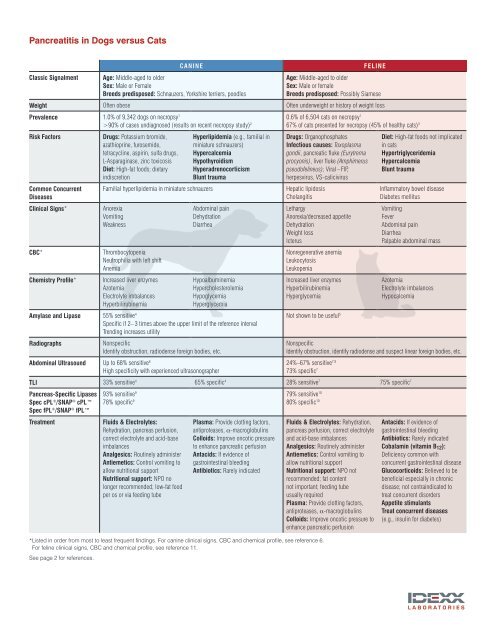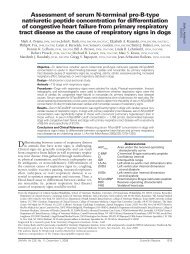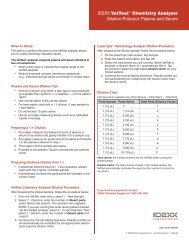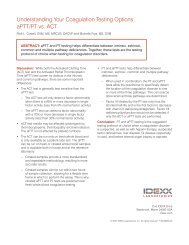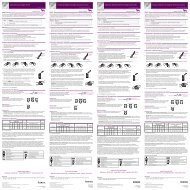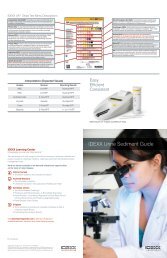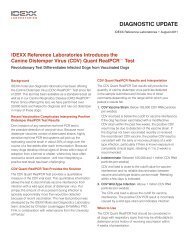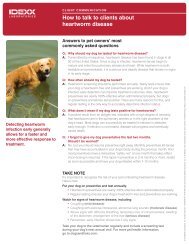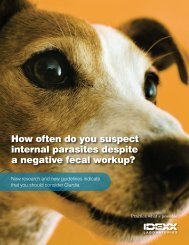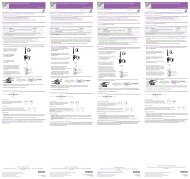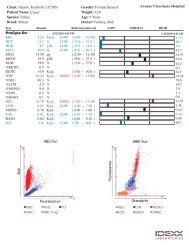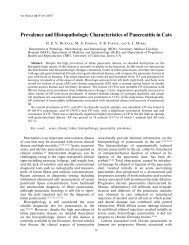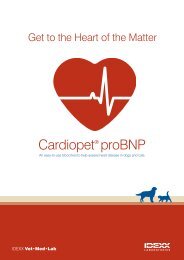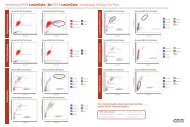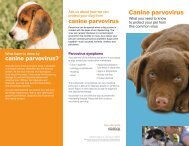Pancreatitis in Dogs versus Cats - IDEXX Laboratories
Pancreatitis in Dogs versus Cats - IDEXX Laboratories
Pancreatitis in Dogs versus Cats - IDEXX Laboratories
- No tags were found...
You also want an ePaper? Increase the reach of your titles
YUMPU automatically turns print PDFs into web optimized ePapers that Google loves.
<strong>Pancreatitis</strong> <strong>in</strong> <strong>Dogs</strong> <strong>versus</strong> <strong>Cats</strong><br />
Classic Signalment<br />
CANINE<br />
Age: Middle-aged to older<br />
Sex: Male or Female<br />
Breeds predisposed: Schnauzers, Yorkshire terriers, poodles<br />
FELINE<br />
Age: Middle-aged to older<br />
Sex: Male or female<br />
Breeds predisposed: Possibly Siamese<br />
Weight Often obese Often underweight or history of weight loss<br />
Prevalence 1.0% of 9,342 dogs on necropsy 1<br />
>90% of cases undiagnosed (results on recent necropsy study) 2 0.6% of 6,504 cats on necropsy 1<br />
67% of cats presented for necropsy (45% of healthy cats) 3<br />
Risk Factors<br />
Common Concurrent<br />
Diseases<br />
Cl<strong>in</strong>ical Signs*<br />
CBC*<br />
Chemistry Profile*<br />
Drugs: Potassium bromide,<br />
azathiopr<strong>in</strong>e, furosemide,<br />
tetracycl<strong>in</strong>e, aspir<strong>in</strong>, sulfa drugs,<br />
L-Asparag<strong>in</strong>ase, z<strong>in</strong>c toxicosis<br />
Diet: High-fat foods; dietary<br />
<strong>in</strong>discretion<br />
Familial hyperlipidemia <strong>in</strong> m<strong>in</strong>iature schnauzers<br />
Anorexia<br />
Vomit<strong>in</strong>g<br />
Weakness<br />
Thrombocytopenia<br />
Neutrophilia with left shift<br />
Anemia<br />
Increased liver enzymes<br />
Azotemia<br />
Electrolyte imbalances<br />
Hyperbilirub<strong>in</strong>emia<br />
Amylase and Lipase 55% sensitive 4<br />
Radiographs<br />
Abdom<strong>in</strong>al Ultrasound Up to 68% sensitive 6<br />
Hyperlipidemia (e.g., familial <strong>in</strong><br />
m<strong>in</strong>iature schnauzers)<br />
Hypercalcemia<br />
Hypothyroidism<br />
Hyperadrenocorticism<br />
Blunt trauma<br />
Abdom<strong>in</strong>al pa<strong>in</strong><br />
Dehydration<br />
Diarrhea<br />
Hypoalbum<strong>in</strong>emia<br />
Hypercholesterolemia<br />
Hypoglycemia<br />
Hyperglycemia<br />
Specific if 2– 3 times above the upper limit of the reference <strong>in</strong>terval<br />
Trend<strong>in</strong>g <strong>in</strong>creases utility<br />
Nonspecific<br />
Identify obstruction, radiodense foreign bodies, etc.<br />
High specificity with experienced ultrasonographer<br />
Drugs: Organophosphates<br />
Infectious causes: Toxoplasma<br />
gondii, pancreatic fluke (Eurytrema<br />
procyonis), liver fluke (Amphimerus<br />
pseudofel<strong>in</strong>eus); Viral – FIP,<br />
herpesvirus, VS-calicivirus<br />
Hepatic lipidosis<br />
Cholangitis<br />
Lethargy<br />
Anorexia/decreased appetite<br />
Dehydration<br />
Weight loss<br />
Icterus<br />
Nonregenerative anemia<br />
Leukocytosis<br />
Leukopenia<br />
Increased liver enzymes<br />
Hyperbilirub<strong>in</strong>emia<br />
Hyperglycemia<br />
Not shown to be useful 5<br />
Diet: High-fat foods not implicated<br />
<strong>in</strong> cats<br />
Hypertriglyceridemia<br />
Hypercalcemia<br />
Blunt trauma<br />
Inflammatory bowel disease<br />
Diabetes mellitus<br />
Vomit<strong>in</strong>g<br />
Fever<br />
Abdom<strong>in</strong>al pa<strong>in</strong><br />
Diarrhea<br />
Palpable abdom<strong>in</strong>al mass<br />
Azotemia<br />
Electrolyte imbalances<br />
Hypocalcemia<br />
Nonspecific<br />
Identify obstruction, identify radiodense and suspect l<strong>in</strong>ear foreign bodies, etc.<br />
24%–67% sensitive 7,8<br />
73% specific 7<br />
TLI 33% sensitive 4 65% specific 4 28% sensitive 7 75% specific 7<br />
Pancreas-Specific Lipases<br />
Spec cPL ® /SNAP ® cPL<br />
Spec fPL ® /SNAP ® fPL<br />
Treatment<br />
93% sensitive 9<br />
79% sensitive 10<br />
78% specific 9 80% specific 10<br />
Fluids & Electrolytes:<br />
Rehydration, pancreas perfusion,<br />
correct electrolyte and acid-base<br />
imbalances<br />
Analgesics: Rout<strong>in</strong>ely adm<strong>in</strong>ister<br />
Antiemetics: Control vomit<strong>in</strong>g to<br />
allow nutritional support<br />
Nutritional support: NPO no<br />
longer recommended; low-fat food<br />
per os or via feed<strong>in</strong>g tube<br />
Plasma: Provide clott<strong>in</strong>g factors,<br />
antiproteases, α-macroglobul<strong>in</strong>s<br />
Colloids: Improve oncotic pressure<br />
to enhance pancreatic perfusion<br />
Antacids: If evidence of<br />
gastro<strong>in</strong>test<strong>in</strong>al bleed<strong>in</strong>g<br />
Antibiotics: Rarely <strong>in</strong>dicated<br />
*Listed <strong>in</strong> order from most to least frequent f<strong>in</strong>d<strong>in</strong>gs. For can<strong>in</strong>e cl<strong>in</strong>ical signs, CBC and chemical profile, see reference 6.<br />
For fel<strong>in</strong>e cl<strong>in</strong>ical signs, CBC and chemical profile, see reference 11.<br />
See page 2 for references.<br />
Fluids & Electrolytes: Rehydration,<br />
pancreas perfusion, correct electrolyte<br />
and acid-base imbalances<br />
Analgesics: Rout<strong>in</strong>ely adm<strong>in</strong>ister<br />
Antiemetics: Control vomit<strong>in</strong>g to<br />
allow nutritional support<br />
Nutritional support: NPO not<br />
recommended; fat content<br />
not important; feed<strong>in</strong>g tube<br />
usually required<br />
Plasma: Provide clott<strong>in</strong>g factors,<br />
antiproteases, α-macroglobul<strong>in</strong>s<br />
Colloids: Improve oncotic pressure to<br />
enhance pancreatic perfusion<br />
Antacids: If evidence of<br />
gastro<strong>in</strong>test<strong>in</strong>al bleed<strong>in</strong>g<br />
Antibiotics: Rarely <strong>in</strong>dicated<br />
Cobalam<strong>in</strong> (vitam<strong>in</strong> B 12 ):<br />
Deficiency common with<br />
concurrent gastro<strong>in</strong>test<strong>in</strong>al disease<br />
Glucocorticoids: Believed to be<br />
beneficial especially <strong>in</strong> chronic<br />
disease; not contra<strong>in</strong>dicated to<br />
treat concurrent disorders<br />
Appetite stimulants<br />
Treat concurrent diseases<br />
(e.g., <strong>in</strong>sul<strong>in</strong> for diabetes)
References<br />
1. Hänichen T, M<strong>in</strong>kus G. Retrospektive Studie zur Pathologie der Erkrankungen<br />
des exokr<strong>in</strong>en Pankreas bei Hund und Katze. Tierärztliche Umschau.<br />
1990;45(6):363–368.<br />
2. Newman S, Ste<strong>in</strong>er J, Woosley K, et al. Localization of pancreatic <strong>in</strong>flammation<br />
and necrosis <strong>in</strong> dogs. J Vet Intern Med. 2004;18(4):488–493.<br />
3. De Cock HE, Forman MA, Farver TB, Marks SL. Prevalence and histopathologic<br />
characteristics of pancreatitis <strong>in</strong> cats. Vet Pathol. 2007;44(1):39–49.<br />
4. Mansfield CS, Jones BR. Plasma and ur<strong>in</strong>ary tryps<strong>in</strong>ogen activation peptide <strong>in</strong><br />
healthy dogs, dogs with pancreatitis and dogs with other systemic diseases.<br />
Aust Vet J. 2000;78(6):416–422.<br />
5. Parent C, Washabau RJ, Williams DA, et al. Serum tryps<strong>in</strong>-like immunoreactivity,<br />
amylase and lipase <strong>in</strong> the diagnosis of fel<strong>in</strong>e acute pancreatitis [ACIM Abstract<br />
57]. J Vet Intern Med. 1995;9(3):194.<br />
6. Hess RS, Saunders HM, Van W<strong>in</strong>kle TJ, Shofer FS, Washabau RJ. Cl<strong>in</strong>ical,<br />
cl<strong>in</strong>icopathologic, radiographic, and ultrasonographic abnormalities <strong>in</strong> dogs with<br />
fatal acute pancreatitis: 70 cases (1986–1995). JAVMA. 1998;213(5):665–670.<br />
7. Forman MA, Marks SL, De Cock HE, et al. Evaluation of serum fel<strong>in</strong>e pancreatic<br />
lipase immunoreactivity and helical computed tomography <strong>versus</strong> conventional<br />
test<strong>in</strong>g for the diagnosis of fel<strong>in</strong>e pancreatitis. J Vet Intern Med. 2004;18(6):807–815.<br />
8. Gerhardt A, Ste<strong>in</strong>er J, Williams D, et al. Comparison of the sensitivity of different<br />
diagnostic tests for pancreatitis <strong>in</strong> cats. J Vet Intern Med. 2001;15(4):329–333.<br />
9. McCord K, Davis J, Leyva F, Armstrong PJ, Simpson KW, Rishniw M, Forman MA,<br />
Biller DS, Twedt D. A multi-<strong>in</strong>stitutional study evaluat<strong>in</strong>g diagnostic utility of Spec<br />
cPL <strong>in</strong> the diagnosis of acute pancreatitis <strong>in</strong> dogs. [ACVIM Abstract 166].<br />
J Vet Intern Med. 2009;23(3):734.<br />
10. Forman MA, Shiroma J, Armstrong PJ, Robertson JE, Buch J. Evaluation of fel<strong>in</strong>e<br />
pancreas-specific lipase (Spec fPL) for the diagnosis of fel<strong>in</strong>e pancreatitis.<br />
[ACVIM Abstract 165]. J Vet Intern Med. 2009;23(3):733–734.<br />
11. Hill RC, Van W<strong>in</strong>kle TJ. Acute necrotiz<strong>in</strong>g pancreatitis and acute suppurative<br />
pancreatitis <strong>in</strong> the cat: a retrospective study of 40 cases (1976–1989).<br />
J Vet Intern Med. 1993;7(1):25–33.<br />
The <strong>in</strong>formation conta<strong>in</strong>ed here<strong>in</strong> is <strong>in</strong>tended to provide general guidance only. As with<br />
any diagnosis or treatment, you should use cl<strong>in</strong>ical discretion with each patient based<br />
on a complete evaluation of the patient, <strong>in</strong>clud<strong>in</strong>g history, physical presentation and<br />
complete laboratory data. With respect to any drug therapy or monitor<strong>in</strong>g program,<br />
you should refer to product <strong>in</strong>serts for a complete description of dosages, <strong>in</strong>dications,<br />
<strong>in</strong>teractions and cautions.<br />
© 2011 <strong>IDEXX</strong> <strong>Laboratories</strong>, Inc. All rights reserved. • 09-79942-02<br />
All ®/TM marks are owned by <strong>IDEXX</strong> <strong>Laboratories</strong>, Inc. or its affiliates <strong>in</strong> the United States and/or other countries.<br />
The <strong>IDEXX</strong> Privacy Policy is available at idexx.com.


